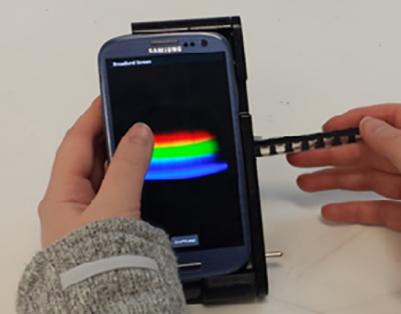Portable biosensor uses smartphone camera as spectrometer
Researchers at the University of Illinois have developed a diagnostic biosensor that uses a smartphone camera as a spectrometer.

(Credit: Department of Bioengineering, University of Illinois at Urbana-Champaign)
According to the Illinois team, the spectral transmission-reflectance-intensity (TRI)-Analyser costs just $550. It can be used to test blood, urine, or saliva samples, with results comparable to clinic-based instruments that cost thousands of dollars.
"Our TRI Analyser is like the Swiss Army knife of biosensing," said Brian Cunningham, a bioengineering and electrical & computer engineering professor at Illinois.
"It's capable of performing the three most common types of tests in medical diagnostics, so in practice, thousands of already-developed tests could be adapted to it."
The device operates by converting the smartphone camera into a high-performance spectrometer. It illuminates a sample fluid with the phone's internal white LED flash or an external green laser diode. The light from the sample is collected in an optical fibre and passed through a diffraction grating into the phone's rear-facing internal camera.
These optical components are all arranged within a 3D-printed plastic cradle. Using a microfluidic cartridge that slides through an opening in the back of the cradle, the TRI Analyser can measure multiple samples successively.
Register now to continue reading
Thanks for visiting The Engineer. You’ve now reached your monthly limit of news stories. Register for free to unlock unlimited access to all of our news coverage, as well as premium content including opinion, in-depth features and special reports.
Benefits of registering
-
In-depth insights and coverage of key emerging trends
-
Unrestricted access to special reports throughout the year
-
Daily technology news delivered straight to your inbox










Water Sector Talent Exodus Could Cripple The Sector
Maybe if things are essential for the running of a country and we want to pay a fair price we should be running these utilities on a not for profit...